His Eminence Metropolitan Kallistos (Ware) departed this earthly life on August 24, 2022.
Here I want to look at: 1 His life. 2 Two (of the many) things I learned from him. 3 My four personal encounters with him.
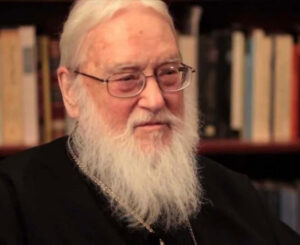 His Life
His Life
Bishop Kallistos was perhaps the most prominent Orthodox theologian, author and lecturer of our time. He had (and will long continue to have) a profound influence on the lives of so many of us, both Orthodox and non-Orthodox.
So far as I can find, his death received no attention in the American secular press – which felt just wrong, but that’s how invisible the Orthodox Church still is in America.
I won’t attempt to tell you his life story. Here are some accounts which I hope you will read for yourself:
https://www.goarch.org/-/remembering-kallistos-ware-revered-orthodox-theologian-religion-news-service-2022
https://www.indcatholicnews.com/news/45350
https://www.christianitytoday.com/ct/2022/august-web-only/kallistos-ware-died-orthodox-church-way-evangelical-dialogu.html
https://religionnews.com/2022/08/24/remembering-kallistos-ware-revered-orthod
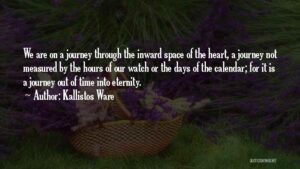
Here is a video interview with Bishop Kallistos from some years back, in which he tells the story of his conversion to Orthodoxy, and discusses (among other things) the place and the future of the Orthodox Church in the modern world. His brilliance, thoughtfulness, good humor, sweetness and kindness come through so plainly. An hour and twenty minutes well worth watching: https://www.youtube.com/watch?v=pxatVu5Qi3k
Videos of many of his lectures can be found online. I’ve certainly not heard them all! but I’m guessing they’re all well worth listening to. I’ve never read or heard anything by Bishop Kallistos that failed to inform me in a positive understandable way.
Two things I learned from Bishop Kallistos
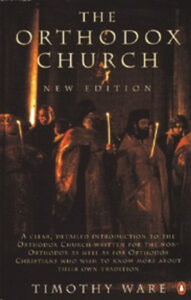 1 Like many of you, I suppose, my first connection with him was through his now-classic book The Orthodox Church, the first edition of which was published in the early 1960s when he was still the young Timothy Ware, a new “convert” from Anglicanism to Orthodoxy. He wrote in the classical Western orderly way *, the style I was accustomed to, so I found it easy reading. I was then an Anglo-Catholic. I found it interesting and agreed with much of it, but I wondered why Mr Ware felt the needed to leave Anglicanism behind. In time I found out why. Then I went back and read The Orthodox Church with understanding and knew where I really belonged.
1 Like many of you, I suppose, my first connection with him was through his now-classic book The Orthodox Church, the first edition of which was published in the early 1960s when he was still the young Timothy Ware, a new “convert” from Anglicanism to Orthodoxy. He wrote in the classical Western orderly way *, the style I was accustomed to, so I found it easy reading. I was then an Anglo-Catholic. I found it interesting and agreed with much of it, but I wondered why Mr Ware felt the needed to leave Anglicanism behind. In time I found out why. Then I went back and read The Orthodox Church with understanding and knew where I really belonged.
- His later similar book The Orthodox Way took a more “spiritual” approach – if that’s the right word. It was only after I had been Orthodox for a while that I could grasp it.
2 Here is a story about Bishop Kallistos which startled me at first. I suspect not many of you know it. It’s from the book A Place of Healing for the Soul: Patmos, written by Peter France in 2002 – a copy of which was given to me soon after that by some good friends.
Though Bishop Kallistos was officially Titular Bishop of Diocleia, serving under the Ecumenical Patriarch, and was lecturer in Eastern Studies at Oxford University in England, he also 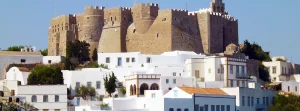 was a monk belonging to the Monastery of Saint John the Theologian on Patmos.
was a monk belonging to the Monastery of Saint John the Theologian on Patmos.
Greekreporter.com
Peter France and his wife left England and moved to Patmos. Mr France came to know Bishop Kallistos through his wife, who had already become Orthodox. He very much wanted to become Orthodox himself and live the Orthodox life, as he saw it being practiced around him, but he had intellectual reservations about some elements of the creed. He thought this precluded him from becoming being baptized. However, he also felt he needed to be in the Church to receive the grace of the sacraments which could rescue him from his disbelief. “A neat circular problem”, he called it. Let me quote from his book:
I put the problem to Bishop Kallistos by letter and he replied by return. He knew my situation well and thought I had spent enough time studying Orthodoxy from the outside. My kairos, as he put it, had come. The Greek word means an appropriate time in one’s life to do something …
The time for me to enter the Orthodox Church had come, he thought, and he would be prepared to baptize me on his next visit to Patmos. As for my problem with the creed, the solution was simple: if I could not recite it for myself then he, if I would trust him, would do it for me.
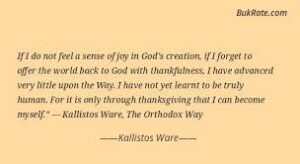
I was shocked at the suggestion. I had always seen baptism as a ceremony in which a converted person filled with shining new certainties was welcomed into the Church. The recital of the Creed was a public declaration by the convert that he had become convinced of these certainties: that God exists, that Jesus was his only son, that he was born of a virgin, that he rose from the dead. I couldn’t honestly say I accepted any of these propositions. So how could I present myself for baptism?… Was I becoming a Christian by proxy?
I had to accept that Bishop Kallistos was a man of wide experience and great learning. More important, he knew me well…
So Mr France was baptized.
Very soon after my second or third communion I realized that I was beginning to experience as realities what I had taken to be colorful imagery. The divine energies present in the Eucharist open within us a capacity to see, or to sense, spiritual realities to which we were insensible. …
 I realized that during the long years I had spent studying Christianity to see whether or not I found it credible, I was missing the point. The creeds of the Church do not contain the Christian truth that Christ said would set us free. They were formalized and written down in response to challenges from outside, when the Church was forced to defend itself …
I realized that during the long years I had spent studying Christianity to see whether or not I found it credible, I was missing the point. The creeds of the Church do not contain the Christian truth that Christ said would set us free. They were formalized and written down in response to challenges from outside, when the Church was forced to defend itself …
The full doctrine of the Church was made available only to baptized Christians. It still is … By taking the first step, by being baptized into the Orthodox Church, I had not experienced any new convictions, but had opened myself to an evolving myth * which the Church has preserved and which exists to communicate to its members.
from A Place for Healing of the Soul, chapter 10
- He uses the word “myth” here not to mean it is untrue, but rather in the classical sense: a story which contains realities too great to be expressed in mere words.
Thereby I learned something fundamental and profound from Bishop Kallistos. Until I read that book, I had been teaching my “Introduction to Orthodoxy” classes in my same old Western way, appealing to the intellect: “Here are the facts, folks. Do you buy into them?”
No. That was the wrong approach. After that I prepared people by having them try to keep the Orthodox life: worship regularly at Divine Liturgy, pray, keep the Feasts and Fasts, get involved with the parish community, love, forgive, give to the needy… the “experiential” way of Orthodoxy. And then later in that context we could learn facts and figures and talk about what it all meant. Thank you, Bishop Kallistos.
My four brief encounters with Bishop Kallistos
Brief indeed.
I realize they will seem like nothing to those who knew him personally and well, as I certainly did not. Nevertheless I was privileged to be with him these four times, each of which showed me something of his character.
Episode One: his kindness
In 1987 I (not yet Orthodox) was visiting a few Orthodox institutions, to see if the Orthodox Church was really what it claimed to be – if the book The Orthodox Church accurately described the reality. By chance I was at Saint Vladimir’s Seminary when Bishop Kallistos was superbly moderating an equally  superb debate * between Father John Meyendorff and Father Thomas Hopko. (“May their memory also be eternal.”) I was in awe.
superb debate * between Father John Meyendorff and Father Thomas Hopko. (“May their memory also be eternal.”) I was in awe.
courtesy of St Vladimir’s
- about a detail of Orthodox theology – this at the time some Anglican theologians were debating basic issues of the Faith.
The next morning, just before I left, I visited Saint Vladimir’s bookstore and bought a great number of books. As I headed for the front door to catch a ride to the train station, struggling with books and suitcase, I heard a gentle English-accented voice behind me: “May I help you?” It was Bishop Kallistos. So it was that one of the foremost Orthodox theologians and authors, this bishop, helped me carry my books to the car. He also was headed for Grand Central Station. He sat with me on the train and (even though he surely needed a break) for 45 minutes listened to and carefully answered this neophyte’s questions about the Orthodox Church and Faith. To put it in casual terms, I was “blown away” by it. I still am.
Episode 2: His Firmness
Six years later, in 1993, my wife and I had been Orthodox for four years, members of the Antiochian Archdiocese of North America. Father Peter Gillquist (also “memory eternal”), who was then chairman of the Missions and Evangelism Committee of the Archdiocese, invited us to join with him in a mission to the UK to try to help some Anglicans join the Orthodox Church.
I was hesitant to go – what were we American Orthodox doing conducting a mission to England? – till I understood the situation. Forgive me for the following lengthy explanation:
 Some Church of England clergy had already gathered together small congregations of people ready to become Orthodox. However, the Orthodox bishops in England did not feel able to receive them as congregations, and rather wanted individuals, one by one, to join already-existing parishes. The issue: Most of the already-existing British parishes were “old country” ethnic and worshiped in non-English languages. Furthermore, this would destroy already-existing communities. The Anglicans believed this was simply not going to work, so finally they appealed to our American Metropolitan Philip, who never rejected anyone in need – bless his compassionate heart. He agreed to take them on and guide them for a few years until they could be formed as a deanery under the Antiochian Metropolitan of Paris. After consulting with the English Orthodox bishops, he believed they understood the situation and had agreed to our coming.
Some Church of England clergy had already gathered together small congregations of people ready to become Orthodox. However, the Orthodox bishops in England did not feel able to receive them as congregations, and rather wanted individuals, one by one, to join already-existing parishes. The issue: Most of the already-existing British parishes were “old country” ethnic and worshiped in non-English languages. Furthermore, this would destroy already-existing communities. The Anglicans believed this was simply not going to work, so finally they appealed to our American Metropolitan Philip, who never rejected anyone in need – bless his compassionate heart. He agreed to take them on and guide them for a few years until they could be formed as a deanery under the Antiochian Metropolitan of Paris. After consulting with the English Orthodox bishops, he believed they understood the situation and had agreed to our coming.
His Grace Bishop Kallistos said he would see us, which we took as a sign that we were welcome. We were greatly honored. We were told by those who knew him that, because he was such a gentle man, we should multiply the expression of his words by a factor of two or three.
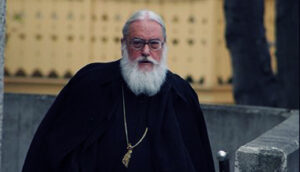 Well…! Somewhere there must have been a “failure of communication”. His Grace’s first words to us were asked in a very stern tone: “What are you doing here?”
Well…! Somewhere there must have been a “failure of communication”. His Grace’s first words to us were asked in a very stern tone: “What are you doing here?”
I had to look long and hard to find a picture of him looking like this!
My immediate thought was I would hate to amplify that by two or three! Father Peter took the lead in trying to explain, but it was clear that Bishop Kallistos was pleased neither with us nor with what we were doing. We left crestfallen, but continued our work as our Metropolitan Philip had directed.
So, the point: When he felt it was necessary, Bishop Kallistos could overcome his natural gentleness and kindness – I think it must have required much effort of his part – and be firm and blunt.
The final result, by the way: As with most things Orthodox, so long as it doesn’t involve heresy, somehow it gets worked out in time. Today in Great Britain there is an English-speaking Antiochian Diocese, under the Metropolitan of Paris, with at least thirteen parishes and missions –  accepted, so far as I know, by the other Orthodox jurisdictions in England.
accepted, so far as I know, by the other Orthodox jurisdictions in England.
Episode Three: His Patience
Perhaps fifteen years later (I can’t remember exactly) our Milwaukee pan-Orthodox Women’s Association (to whom I was clergy representative at the time) somehow arranged for Bishop Kallistos to come to Milwaukee for a couple of days. To say we over-scheduled him would be to put it mildly. The women arranged for him to speak to every Orthodox organization they could find, and my assigned task was to pick him up at the hotel and drive him hither and thither to all the meetings. (To my relief, either he had forgotten our prior meeting or was kind enough not to mention it!) So did I do the kind thing, the thoughtful thing, and ask if he needed some quiet time as I drove him about? I did not. Again I continually pestered him with questions, and again he patiently answered them.
Afterwards I felt so bad, so guilty about that. I still do.
Episode Four: His Persistence and Dedication
This took place about ten years ago, I think. Bishop Kallistos spoke at Marquette University in Milwaukee. As he approached age eighty he was still traveling the world, still giving of himself unstintingly for the life of the Church. This time I behaved myself and only said “thank you”.
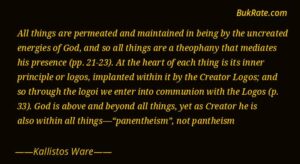
If, by the grace of God, I’m privileged to see Metropolitan Kallistos one more time “over there”, first I will ask his forgiveness. Then I will try very hard not to ask him more questions, because I do hope he gets at least some time to “rest in peace” after all his labors…
…before our Lord puts him to use again. For I feel sure God will have more traveling, more teaching, for him to do in His Kingdom, and more gentle guidance to give us. There is so much Bishop Kallistos knows that I want to learn, so much he is that I want to become.
His Eminence Metropolitan Bishop Kallistos Ware – one of The Great Ones. May your memory be eternal! as certainly it will be.
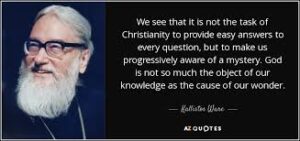
Next Week: The changes I have seen in the past eighty years
Week after Next: “God is good and loves mankind.” Really?
Met. Kallistos’s books were likewise my first real introduction to the Orthodox world (apart from my studies of Byzantine history). I often give or loan out copies of The Orthodox Way to others. Even my Protestant friends, who have no desire to move into the Orthodox Church, have said this book has deepened their relationship with Christ.
I never had the chance to meet him. But thanks to Youtube we still have the chance to hear him. I return often to his lectures. But I also love his humor – this youtuber make a quick digest of some of his better stories.